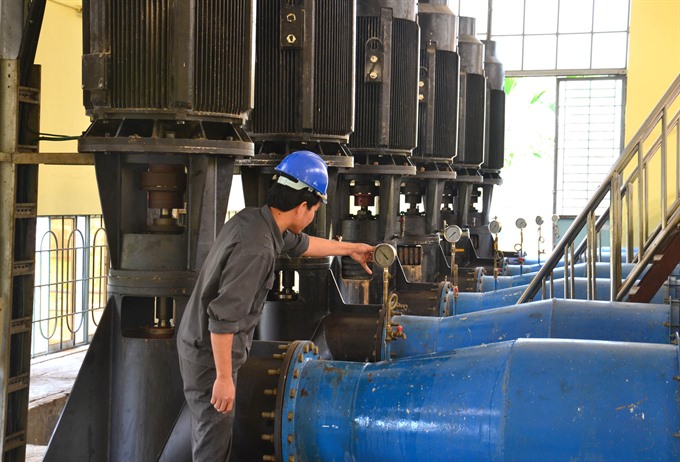 Environment
Environment

Đà Nẵng needs to invest in its tap water supply system, especially in remote areas, to effectively limit the rampant and rapid exploitation of underground water, experts have said.
 |
| A worker operates bumpers to supply clean water for residents in the central city of Đà Nẵng. Experts say that the city needs to invest in its tap water supply system, especially in remote areas. – VNA/VNS Photo Đinh Văn Nhiều |
ĐÀ NẴNG – The central city of Đà Nẵng needs to invest in its tap water supply system, especially in remote areas, to effectively limit the rampant and rapid exploitation of underground water, experts have said.
This and other solutions were proposed at the conference on exploitation, protection and proper use of underground water resources held in the city on Wednesday.
Nguyễn Đình Anh, deputy director of the city’s Department of Natural Resources and Environment, said that in the past years the water demand for daily use, agricultural and industrial production, and services have been increasing, leading to the over-exploitation of surface and underground water.
Department figures show that the total volume of underground water in the city is roughly 231,059 cubic metres per day. However, the water is distributed to different areas of the city, so it was impossible to exploit it all for the water supply.
Meanwhile, agricultural production, animal husbandry, industrial production, mining and urban waste water continue to pollute rivers. Salinity and water shortage in the dry season due to the impact of economic development activities along the Vu Gia - Thu Bồn river basin have caused surface water loss and affected its quality.
Therefore, underground water has played an extremely important role in supplementing the city’s water supply, he said.
The city’s water use demand is huge and constantly increasing. By 2020, the amount of water required for agricultural production will be 90 million cubic metres per year, for daily use will be 110 million cubic metres per year, and for industrial production will be 26 million cubic metres per year.
Currently, there are 52 underground water exploitation projects licensed by the city People’s Committee with a maximum total flow of 14,091 cubic metres per day, equivalent to 6.1 per cent of its volume, and 2,500 unregistered wells are used by local households.
Đình Anh said many wells were dug without proper technical practice, leading to over-exploitation of underground water. Worse, additional water sources continue to be degraded by rising seas caused by climate change, especially in the area of Sơn Trà District, where the water source has been seriously intruded.
Bùi Thọ Ninh, representative of Đà Nẵng Water Supply JSC, said that to limit the rampant exploitation of groundwater, the city should invest in tap water supply network to ensure its quality and stability to meet the requirements of local residents.
In addition, it is necessary to strengthen the State management of businesses or households exploiting and using underground water. Those who are found to violate the regulations on water use must be given strict punishment.
Đình Anh, deputy director of the city’s Department of Natural Resources and Environment, said the department has proposed the city’s authority to specify areas which will be restricted or banned from underground water exploitation.
Local authorities in seven districts were asked to survey water exploitation in each area. Specifically, the People’s Committees of each commune and ward will be in charge of managing underground water exploitation projects such as wells. Unregistered wells will be filled in. – VNS




